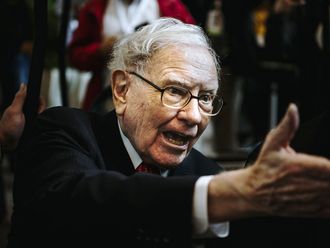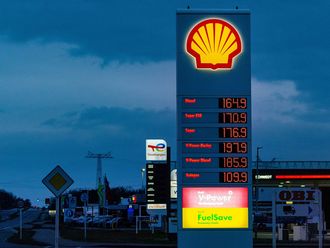New York: Oil fell, posting its biggest weekly loss in three months, after China ordered banks to raise reserves in a move that may slow growth in the world's largest energy-consuming country.
Futures dropped 0.4 per cent after China told lenders for the fifth time this year to set aside more funds to drain cash from the financial system and limit asset bubbles. Economic growth will spur a 9.5 per cent jump in 2010 Chinese oil use, according to a November 12 International Energy Agency report.
"These further moves by the Chinese to rein in their economy and the real concern they're expressing about inflation is weighing on this crude market," said John Kilduff, a partner at Again Capital LLC, a New York-based hedge fund focusing on energy.
Crude for December delivery fell 34 cents to settle at $81.51 (Dh299) a barrel on the New York Mercantile Exchange. Prices have dropped 4 per cent since November 12, the most since the week ended August 13. The December contract expired on Friday. The more active January contract slipped 44 cents, or 0.5 per cent, to $81.98.
The People's Bank of China said it will raise the reserve ratio requirement for the nation's banks by 50 basis points starting November 29. Speculation of an imminent increase in interest rates to counter inflation helped to drive the biggest selloff in China's benchmark stock index since May over the past two weeks.
Inflation concern
"The Chinese are fearful of inflation, and that's causing a bit of risk reduction in the market," said Robert Montefusco, a senior broker with Sucden Financial in London.
Chinese oil-consumption growth of 4.3 per cent for next year compares with flat demand in North America and a decline among Europe's industrialised nations, the Paris-based IEA forecast last week in its monthly Oil Market Report.
US consumption of gasoline increased 0.1 per cent during the first 10 months of the year from the same period a year earlier to average 9.02 million barrels a day, the American Petroleum Institute said in a report on Friday.
Gasoline prices retreated on the Chinese move, and the hypothetical profit margin, or crack spread, to process crude into the motor fuel fell from a three month high. The spread more than doubled this month as plants along the US East Coast shut for repairs and imports from Europe declined in the aftermath of a French strike.
Gasoline for December delivery fell 3.23 cents, or 1.5 per cent, to $2.196 a gallon on the Nymex. The gasoline-crude oil crack spread, based on December futures, dropped $1.017 to $10.722 a barrel.
Oil in New York also decreased last week amid concern Europe's credit crisis would deepen because of mounting debt at Irish banks. EU, International Monetary Fund and European Central Bank officials spent a second day meeting in Dublin, and Irish Prime Minister Brian Cowen on Friday said talks about potential aid are "going well."
"We've been worried about two major issues, Ireland's debt concern and Chinese rate rises," said David Taylor, a market analyst at CMC Markets Ltd. in Sydney.
Oil in New York may increase this week amid speculation Ireland will accept a bailout, a Bloomberg News survey showed. Eighteen of 38 analysts and traders, or 47 per cent, forecast crude will climb through this Friday. Ten respondents, or 26 per cent, predicted prices will fall and 10 estimated there would be little change. Last week, 43 per cent said futures would rise.
Seasonal change
Crude jumped to a two-year high of $88.63 a barrel on November 11 after trading for above $80 for all of October and November.
"What we're seeing now in my judgment is not a secular change, but very much a seasonal change," said Edward Morse, head of commodities research at Credit Suisse Group AG in New York, in a television interview on "Bloomberg Surveillance" with Tom Keene. "The move above $80 was a fourth-quarter, high-demand move and it also was sparked a little by some problems in China, some problems in Europe."
Brent crude for January settlement fell 71 cents, or 0.8 per cent, to $84.34 a barrel on the ICE Futures Europe exchange in London. That's $2.36 a barrel more than the January contract in New York, more than double the difference of a week ago.
Oil volume in electronic trading on the Nymex was 508,362 contracts in mid-afternoon. Volume totalled 712,780 contracts Thursday, 0.2 per cent below the average of the past three months. Open interest was 1.35 million contracts.












